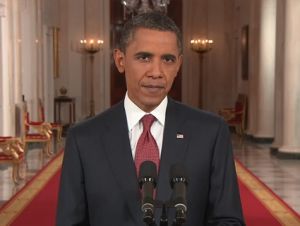Obama Blunders Defining Real Causes of Debt?

Not surprisingly, Dean Baker -- the economist who loudly and accurately warned of an impending housing asset crash -- has critiqued President Obama's debt ceiling remarks last night, proclaiming that the President doesn't get what actually caused America's massive budget deficit and thus is prescribing the wrong measures -- like Medicare and Social Security cuts -- to fix it.
Baker quotes the President's remarks:
For the last decade, we have spent more money than we take in. In the year 2000, the government had a budget surplus. But instead of using it to pay off our debt, the money was spent on trillions of dollars in new tax cuts, while two wars and an expensive prescription drug program were simply added to our nation's credit card.
As a result, the deficit was on track to top $1 trillion the year I took office.
Baker then points out that Obama's version of history is wrong. He reminds that the Congressional Budget Office projections in early 2008 projected a deficit of $198 billion in 2009, when Obama took office. The country was not then on track to have a trillion dollar deficit.
What caused the deficit, according to Baker, were the policies responding to the economic downturn triggered by the collapse of housing prices -- not entitlement program spending, or the wars, or tax cuts.
Paul Krugman seems to have laid the track for Obama's argument in an essay in May of this year arguing that there were three drivers that undermined America's economic solvency thus wiping out the budget surplus of 2000.
Krugman writes:
What happened to the budget surplus the federal government had in 2000?The answer is, three main things. First, there were the Bush tax cuts, which added roughly $2 trillion to the national debt over the last decade. Second, there were the wars in Iraq and Afghanistan, which added an additional $1.1 trillion or so. And third was the Great Recession, which led both to a collapse in revenue and to a sharp rise in spending on unemployment insurance and other safety-net programs.
The unpaid for wars. The 'temporary' Bush tax cuts for the rich. And the subprime-triggered global financial crisis and recession.
I understand that the downturn in receipts to the government triggered by the housing bubble-triggered recession and the massive spending in response were a huge contributor to America's fiscal hole at the moment. Baker is right about that.
But I think Baker is too quick to discount the impact of unpaid for wars -- and of the significant revenue impact of the 'not so temporary' Bush tax cuts.
When the economic crisis hit -- these other factors compounded the deficit hole-digging that the country has been in. One wonders then why President Obama hasn't been more aggressive in drawing down excessive defense spending on challenges that were not at the forefront of America's most serious strategic problems.
Furthermore, the Congressional Budget Office has been wildly inaccurate in recent years in its projections. Former Congressman and Verizon government affairs chief Tom Tauke has been doing some interesting blogging of late about the CBO's rose-colored glasses and that legislators need to compensate for the consistently mistaken projections of the budget forecast unit.
Dean Baker's assessments always deserve careful consideration -- and I imagine that he will stick to his guns on this latest argument. But the debate here is not between Obama and Baker, it's really between Paul Krugman and Dean Baker.
I agree with Krugman that the financial crisis, unpaid for wars, and reckless tax cuts undermined the budget surplus of 2000 and left the country ill-prepared to deal with a fiscal shock. I also agree with Dean Baker, however, that the White House has been seduced into a battle over entitlement spending and cuts that has little to do with America's economic morass -- and this is a serious problem.
President Obama should get back to explaining to the country what the drivers of our fiscal condition are -- and not only blow holes in the arguments being made by his political rivals about large scale entitlement cuts but also explain why he and his team have been as slow as they have been to extract themselves from costly, low strategic return wars as well as unable to end the corrosive effects and socio-economic stress caused by the Bush tax cuts for America's richest citizens.